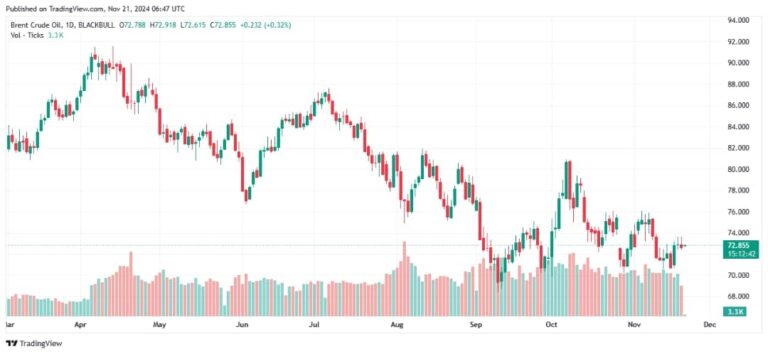Post Views:
67
Akintunde Oyedokun
Research Analyst
Oil prices rose nearly 2% on Thursday as escalating tensions between Russia and Ukraine stoked fears of crude supply disruptions. Russian President Putin confirmed a missile strike on Ukraine and warned of retaliatory action against countries arming Kyiv. With Russia being a key oil exporter, analysts are concerned about the potential impact on global supply. Brent crude rose by $1.42 to $74.23 per barrel, while U.S. WTI gained $1.35 to $70.10. Additionally, U.S. crude inventories increased, and OPEC+ may delay output hikes due to weak demand.
Economic Struggles Leave Turkish Job Seekers Feeling Hopeless
Rephrased Summary: Berkay Ucar, a 24-year-old software developer in Ankara, is losing hope after months of unsuccessful job hunting. He reflects a growing number of job seekers in Turkey who are discouraged by rising unemployment and economic struggles. Turkey’s shift to higher interest rates has worsened job prospects, with many giving up on finding work. While unemployment is at 8.6%, the real outlook is grim, and frustration with government policies is rising.
Unemployment Claims Drop To Seven-Month Low, But Job Search Struggles Persist
New U.S. unemployment claims fell to 213,000 last week, the lowest in seven months, signaling potential job growth recovery in November. However, longer job searches for laid-off workers pose risks to the unemployment rate. Despite minimal layoffs, the prolonged unemployment benefit claims suggest labor market weakness, possibly affecting future interest rate decisions by the Federal Reserve.
South Africa Cuts Interest Rate To 7.75% Amid Global Uncertainty, Lower Inflation
South Africa’s central bank cut its main interest rate by 25 basis points to 7.75% on Thursday, citing a tough global environment and uncertain domestic conditions, despite inflation falling to 2.8%. The decision was unanimous, with no discussion of a larger cut. While inflation is projected to remain below 4% in 2024, economic growth is expected to recover slowly, supported by reforms and consumer spending. Analysts forecast further gradual rate cuts in the next year.
Senate Approves $2.2bn Loan, Proposes Eurobonds, Sukuk
Senator Wammako proposed that Nigeria raise the $2.2 billion external borrowing through Eurobonds, sovereign Sukuk, and syndicated loans, depending on market conditions. The Senate approved the plan at an exchange rate of N800 to $1 for the 2024 budget.
Deputy Senate President Jibrin Barau commended the committee after the unanimous approval. The borrowing is part of efforts to address the N9.7 trillion budget deficit.
President Bola Tinubu had requested approval for the loan on Nov 19, 2024. Additionally, the government is negotiating a $500 million loan from the World Bank to improve Nigeria’s education sector.








